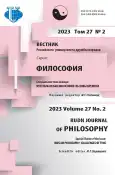One’s Own and Foreign in Context of Later Heidegger’s Philosophy
- Autores: Pigalev A.I.1
-
Afiliações:
- Volgograd State University
- Edição: Volume 27, Nº 2 (2023): MUSLIM PHILOSOPHY: CHALLENGES OF TIME
- Páginas: 406-420
- Seção: HISTORY OF PHILOSOPHY
- URL: https://journal-vniispk.ru/2313-2302/article/view/325268
- DOI: https://doi.org/10.22363/2313-2302-2023-27-2-406-420
- EDN: https://elibrary.ru/HVTPYI
- ID: 325268
Citar
Texto integral
Resumo
The purpose of the paper is to analyze the interrelations between the notions of one’s own and the foreign in later Heidegger’s philosophy. It is pointed out that later Heidegger contextualized the notion of the world by the notion of home and its derivatives “homelessness” and “homecoming” that are of great value in his philosophy. The scrutiny proceeds from the study of the peculiarities of Heidegger’s approach to the problem of being that is considered to be the knot of his philosophy. It is noted that Heidegger, having deserted the traditional ontology already in his early works, continued, nevertheless, using its terms including “being” for a long time and thereby in a way obscured the peculiarities of his approach. Only later Heidegger tried to reject the traditional concept of being as infinitely continuing state in favor of the concept of Ereignis that is usually translated as “appropriating event” or “event of appropriation”. Thus, according to Heidegger, being gives us beings as a whole by appropriating sense to them and thereby turning them into the familiar and accessible environment for dwelling. Just the “givenness” of beings as a whole makes them familiar, one’s own. Accordingly, the “dwelling” means for Heidegger not only the security, but also the intelligibility of the environment, whereas the homelessness means the latter’s uncanny incomprehensibility. It is emphasized that Heidegger’s interpretation of homelessness is closely connected with a standard theoretical model explaining the emergence of the private and public realms. According to this model, just the extension of family as the initial one’s own resulted in the turning of household into city-state that, having been specified by the image of one super-family, added the elements of the foreign to the initial state of society.
Palavras-chave
Sobre autores
Alexander Pigalev
Volgograd State University
Autor responsável pela correspondência
Email: pigalev@volsu.ru
ORCID ID: 0000-0003-4858-8862
Doctor of Philosophy, Professor, Leading Researcher, Department of Philosophy and Theory of Law
100, Universitetskiy Pr., 400062, Volgograd, Russian FederationBibliografia
- Heidegger M. Beiträge zur Philosophie. (Vom Ereignis). In: Gesamtausgabe. Bd. 65. Frankfurt am Main: Vittorio Klostermann; 1989.
- Heidegger M. Identität und Differenz. In: Gesamtausgabe. Bd. 11. Frankfurt am Main: Vittorio Klostermann; 2006.
- Heidegger M. Was ist das Sein selbst? In: Gesamtausgabe. Bd. 16. Frankfurt am Main: Vittorio Klostermann; 2000. S. 423—424.
- Heidegger M. Prolegomena zur Geschichte der Zeitbegriffs. In: Gesamtausgabe. Bd. 20. Frankfurt am Main: Vittorio Klostermann; 1979.
- Husserl E. Logische Untersuchungen. 4. Aufl. 2. Band, II Teil. Tübingen: Max Niemeyer; 1968.
- Heidegger M. Vier Seminare. In: Gesamtausgabe. Bd. 15. Frankfurt am Main: Vittorio Klostermann; 1986. S. 271—421.
- Heidegger M. Logik. Die Frage nach der Wahrheit. In: Gesamtausgabe. Bd. 21. Frankfurt am Main: Vittorio Klostermann; 1976.
- Heidegger M. Zur Bestimmung der Philosophie. In: Gesamtausgabe. 2. Aufl. Bd. 56/57. Frankfurt am Main: Vittorio Klostermann; 1999.
- Sheehan T. The Turn. In: Martin Heidegger: Key Concepts. Davis BW, editor. Durham (UK): Acumen; 2010. P. 82—101.
- Sheehan T. The Turn: All Three of Them. In: The Bloomsbury Companion to Heidegger. Raffoul F, Nelson ES, editors. London, et. al.: Bloomsbury; 2013. P. 31—38.
- Sheehan T. Making Sense of Heidegger: A Paradigm Shift. London, New York: Rowman and Littlefield International Ltd; 2015.
- Heidegger M. Zum Ereignis-Denken. In: Gesamtausgabe. Bd. 73.1. Frankfurt am Main: Vittorio Klostermann; 2013.
- Heidegger M. Über den Anfang. In: Gesamtausgabe. Bd. 70. Frankfurt am Main: Vittorio Klostermann; 2005.
- Polt R. Ereignis. In: A Companion to Heidegger. Dreyfus HL, Wrathall MA, editors. Malden (MA): Blackwell; 2005. P. 375—391.
- Polt R. The Emergency of Being: On Heidegger’s Contributions to Philosophy. Ithaca (NY), London: Cornell University Press; 2013.
- Polt R. Time and Trauma: Thinking Through Heidegger in the Thirties. London, New York: Rowman and Littlefield International Ltd; 2019.
- Heidegger M. Einführung in die Metaphysik. In: Gesamtausgabe. Bd. 40. Frankfurt am Main: Vittorio Klostermann; 1983.
- Arendt H. Vita Activa oder Vom tätigen Leben. Bibikhin VV, transl. Nosov DM, editor. Saint Petersburg: Aletheia; 2000. (In Russian).
- Gurwitsch A. Gaston Berger, Le cogito dans la philosophie de Husserl. In: The Collected Works of Aron Gurwitsch (1901—1973). Vol. 1. García-Gómez J, transl., editor. Dordrecht, et al.: Springer; 2009. P. 441—447.
- Mugerauer R. Heidegger and Homecoming: The Leitmotif in the Later Writings. Toronto, Buffalo, London: University of Toronto Press; 2008.
- O’Donoghue B. A Poetics of Homecoming: Heidegger, Homelessness and the Homecoming Venture. Newcastle upon Tyne: Cambridge Scholars Publishing; 2011.
Arquivos suplementares









